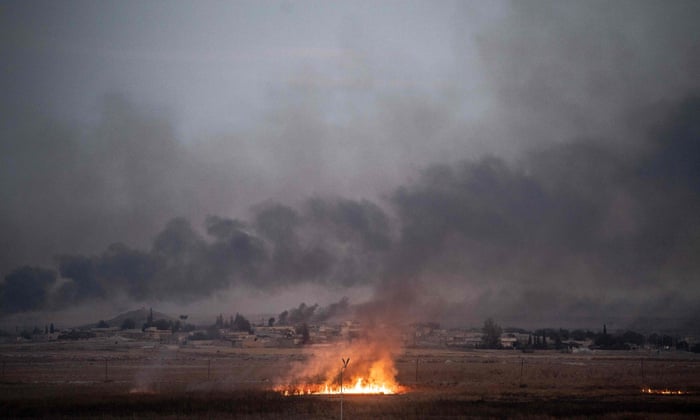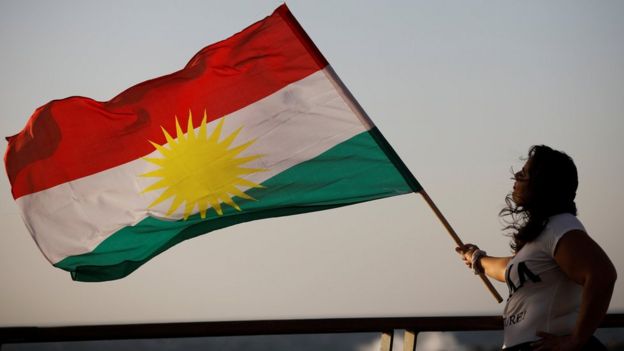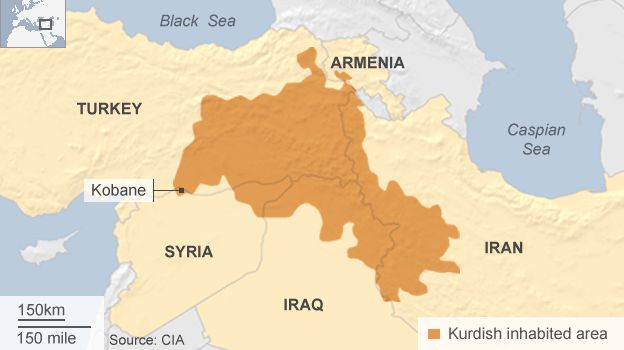Abandoning Syrian Kurds to Turkey's Deadly Invasion
"This unilateral action [Turkey invading Syria's northeastern border to establish a 'safe zone' through clearing the presence of Kurds from majority Kurdish enclaves between Syria and Turkey] risks undermining the stability of an already-fragile region, exacerbating the humanitarian situation and rolling back progress achieved by the Global Coalition Against Daesh, of which Turkey is a member."
"We call for the protection of civilians and on all parties to respect their obligations under international law, including unhindered access for humanitarian aid."
Department of Foreign Affairs, Canada
"Damascus needs the Kurds. The Kurds and Damascus have two things in common: enmity for Turkey and a desire not to see Sunni rebel militias ruling the northeast of Syria."
"But they don’t agree on anything when it comes to ruling northeast Syria."
"I think there will be real friction but I do think the Russians will be able to manage it. There is a deal to be made [between Russia, Syria and Turkey]."
Joshua Landis, head, Center for Middle East Studies, University of Oklahoma
 |
| Smoke rises from the Syrian border town of Tel Abyad, following an offensive by pro-Turkish forces. Photograph: Bülent Kılıç/AFP via Getty Images |
Turkey, as a member of the North American Treaty Alliance, has under the ruling Justice and Development Party of President Recep Tayyip Erdogan, increasingly challenged the values and loyalty to shared democratic principles of all other members of NATO. Erdogan's incendiary hatred for the Kurds living within Turkey and within the boundaries of Iran, Iraq and Syria is expressed by his description of their nationhood-aspiring collective as "terrorists".
It is well understood within NATO countries that Turkey gave support to Islamist Sunni rebels and militias including those of Islamic State, whom Erdogan regards as legitimate fighters, not terrorists.
As Erdogan unleashed his full military might against the towns and villages with largely Kurdish populations along the corridor within Syria contiguous with the border of Turkey, airstrikes on civilian targets have continued to claim the lives of civilians. The Syrian Sunni rebel groups reliant on Turkish support have been invited by Erdogan to join Turkish troops in battling the YPG and the Syrian Democratic Forces, responsible for the well-being of millions of Kurdish lives.
Which gave the Syrian rebels entry to the semi-autonomous Kurdish state in Syria's northeast, which the Kurdish military with U.S. air cover wrenched back from Islamic State terrorists to enable them to wreak their ISIS-style atrocities on Kurds, going so far as to video their barbaric slaughter of vulnerable victims, including a female Kurdish politician caught with her bodyguards while driving on a road the rebel militias were entering into Kurdish territory.
Germany and France along with several other NATO members, and now Canada, have declared an immediate halt to military weapons transfers and sales to Turkey as its army pushes into Kurdish territory. Everyone was caught off guard by U.S. President Donald J. Trump's sudden agreement in a telephone conversation with his Turkish counterpart to withdraw American support in northeast Syria and leave the Kurds to look after their own welfare, after they had spent years of sacrifice battling Islamic State not only for their own security but that of the U.S.
Canada had promised upgraded weaponry to be delivered to its Kurdish allies whom members of the Canadian military have been engaged in training. Those weapons were held up, placed in storage and remain there, never delivered to the courageous Kurds whose defensive weapons are no match for those of the technologically-advanced Turkish military nor its warplanes. Canada has a record of supplying significant levels of military goods to Ankara yearly, estimated at over $115 million in defence-related products in 2018 alone.
The military electronics and imaging goods Canada sold to Turkey is now being used in bombing the Kurdish enclaves. Turkey is a signer of the selective Automatic Firearms Country Control List where Canadian defence companies can sell tightly restricted weapons to the Kurdish military through export permits. The Kurds (the 4th largest ethnic group in the Middle East), have been allies of Canada, and Canada, like the U.S. and other NATO-aligned countries, have failed the Kurds, long deserving of establishing their own sovereign territory on their ancient ancestral land, allocated by France and Britain to Iraq, Iran, Syria and Turkey 100 years ago.
 |
| Long history aside Kurds have never achieved a permanent nation state Reuters |
Canada's current minister of Foreign Affairs, Chrystia Freeland, while condemning Turkey's invasion of Kurdish-majority semi autonomous northeastern Syria, also saw fit to laud Ankara for resettling Syrian refugees fleeing the Syrian civil war and the bombing rampages of Syria's Shiite President Bashar al-Assad who, like Turkey's Erdogan, described the Syrian Sunni protesters as "terrorists". As for the haven that Erdogan has given Syrian refugees, he has been attempting to persuade and to forcibly return them to Syria.
And this is where the 'safe zone' he is attempting to clear of Kurds comes in; Erdogan's intention is to move an estimated two million of the 3.2 million Syrian refugees out of Turkey to populate the towns and villages that hundreds of thousands of Kurds have been forced to flee under Turkish air bombing. With the decision of the European Union to halt any further sales of military goods to Turkey, Erdogan has responded by threatening to open the floodgates once again into Europe for Syrian refugees, jettisoning the agreement he has with the EU which has already absorbed millions of refugees.
Kurdish authorities in desperation had little option left to them to try to protect the vast numbers of Kurdish people at risk of annihilation through Erdogan's cleansing aspirations, but to call upon a lesser evil to come to their aid. Syria's regime was happy to comply, for in so doing, the Kurdish geography of northern Syria, representing almost a full one-third of territory wrested from Islamic State would thus fall back under Syria's authority. How the Kurdish authority could negotiate with the regime to respect their autonomy while challenging the Turkish incursion to save Kurdish lives will be a mystery.
Now, it is Russia's turn to intervene. Its alliance with Syria is of utmost importance to the Kremlin and Vladimir Putin, able to take possession of a deep-sea port and air installations for Russia to reestablish hegemony in the region once again, with the departure of the United States started by the Obama regime and continued by that of Trump's White House. Syria's stability is Russia's first priority, a priority that will revolve around Mr. Putin persuading his Turkish ally to stand down from his intentions before many more lives are lost.
With the near-absence of the United States to mediate within the Middle East, the axis of power has been shifting steadily and perhaps irrevocably, and now there is Russia, allied with Iran, with Syria, and further afield with Turkey. Iran brings with it Qatar, Iraq, Lebanon and Yemen, as well as Syria and Hezbollah and Hamas. A coterie of terrorist-inclined Islamists to continue roiling the always-muddied waters of the violent Middle East.

Labels: Allies, Canada, Kurds, Military Weapons, NATO, Syria, Turkish Military Invasion
0 Comments:
Post a Comment
<< Home